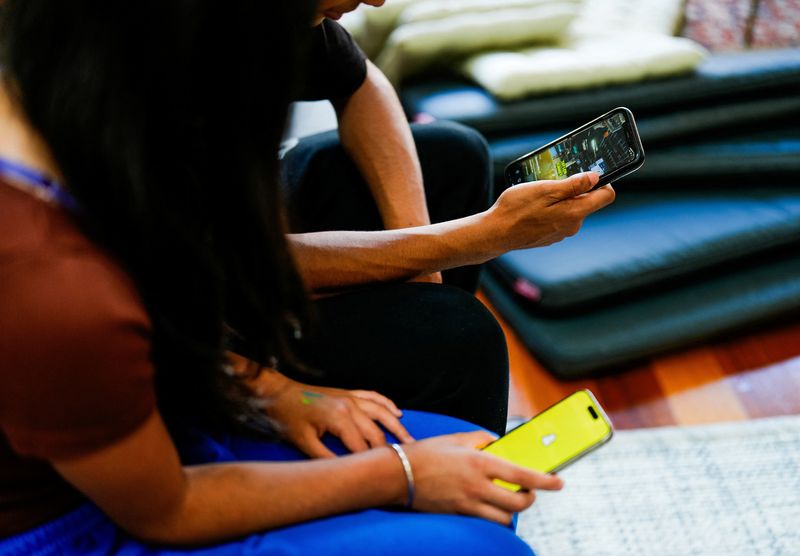By Byron Kaye and Alasdair Pal
SYDNEY (Reuters) – Software program (ETR:) testers employed by Australia’s authorities to find out implement the world’s first nationwide teen social media ban have labored on defence and election contracts however will use one other expertise to information their research: wrangling their very own youngsters on-line.
“We’re all parents of kids of various ages and we’re definitely aware of all the little tricks kids do,” mentioned Andrew Hammond, common supervisor at tech contractor KJR which is able to conduct the trial on about 1,200 randomly chosen Australians from January to March.
“Kids are quite resourceful so we’ll definitely have our eyes and ears open,” added Hammond, whose firm’s earlier initiatives included checking deployment software program for Australian troops in Afghanistan.
The research, one of many largest ever trials of age-checking expertise, will possible set the course for lawmakers and tech platforms world wide as they navigate a push to age-restrict social media at a time of rising concern about youth psychological well being and information assortment.
From late 2025, platforms together with Meta (NASDAQ:)’s Instagram, Elon Musk’s X, TikTok and Snapchat should present Australians they’re taking cheap steps to maintain out customers below 16 or face fines as much as A$49.5 million ($32 million). Google (NASDAQ:)’s YouTube, a classroom staple, is exempt.
However the laws doesn’t specify what these cheap steps should be. That’s right down to the trial, overseen by the Age Test Certification Scheme, a British consulting agency, which expects about 12 collaborating tech corporations and should give suggestions by mid-2025.
Choices embody age estimation the place a person’s video selfie is biometrically analysed then deleted; age verification the place a person uploads figuring out paperwork to a third-party supplier which sends an nameless affirmation “token” to the platform; and age inference the place a person’s e-mail deal with is cross-checked with different accounts.
“The approach the Australian government takes could influence how other countries approach online age checks for social media content,” mentioned Julie Dawson, chief coverage and regulatory officer at age-verification firm Yoti, which does age checks for Meta’s new system of heightened privateness settings for teenage Instagram customers.
Some European nations and U.S. states have legislated age minimums for social media, however none has rolled out an enforcement regime attributable to authorized challenges primarily based on preserving privateness and free speech.
Even lawmakers in Australia’s conservative opposition, whose help was wanted to get the centre-left authorities’s ban via parliament, warned the ban might justify amassing private info – an echo of a November publish from X proprietor Elon Musk that it “seems like a backdoor way to control access to the Internet by all Australians”.
Communications Minister Michelle Rowlands informed parliament the ban was “not about government mandating any form of technology or demanding any personal information handed over to social media companies”.
A final-minute change to the regulation stipulates that platforms asking for figuring out paperwork should supply an alternate age-gate.
YOUNG USERS, YOUNGER TECH
Strain to dam minors from elements of the web has been round since pornography and playing web sites overran the early worldwide internet. It has taken on a brand new urgency since a Meta whistleblower leaked inner emails in 2021 purportedly displaying information its merchandise have been dangerous to younger customers. Meta has mentioned the paperwork have been misinterpreted.
Rising demand has spurred technological improvement, however no product but is fool-proof with regards to combining accuracy, privateness, safety and user-friendliness, mentioned Tony Allen, CEO of the Age Test Certification Scheme, which is able to check merchandise for Australia on these standards.
Including to the problem, many individuals within the age vary focused by bans do not need frequent figuring out paperwork corresponding to a driver’s licence or bank card.
That helps the case for age-checking expertise involving evaluation of an individual’s options, corresponding to facial wrinkles or their hand.
Yoti, Meta’s age-checking accomplice, says its accuracy has improved to the purpose the place it may possibly decide greater than 99% of individuals aged 13-17 as below 25. It says its customary deviation of error in guessing the age of an 18-year-old is simply over one 12 months.
That will not but be correct sufficient for an age restriction in a rustic of 27 million folks, mentioned Konstantin Poptodorov, director of fraud and identification for digital identification firm LexisNexis Threat Options, whereas noting the fast enhancements and uptake of applied sciences corresponding to facial recognition previously decade.
Meta’s coverage director for Australia and New Zealand, Mia Garlick, mentioned Yoti benefitted Instagram’s teen privateness coverage however appearance-wise “some people grow up really quickly, and some people don’t”.
Meta did not know if increasing its Yoti association would fulfill the Australian ban as a result of “we don’t know if what we do currently is going to be considered ‘reasonable steps'”, she added.
Suppliers which depend on uploaded identification paperwork could take part within the trial however “almost the whole ethos behind the way age assurance works is ‘we don’t want to collect any data’,” mentioned age certification scheme CEO Allen.
Software program testers would ask some trial members to attempt to idiot the expertise with appearance-adjusting filters however would weed out solely the merchandise which did not cease workarounds deemed low cost and scalable.
Allen had no front-runner for what product he would suggest however did predict one suggestion.
“There should be choice for consumers,” he mentioned.

“They should all be as effective and meet a certain level of assurance, but if you’re looking for a silver bullet you won’t find it.”
($1 = 1.5411 Australian {dollars})




